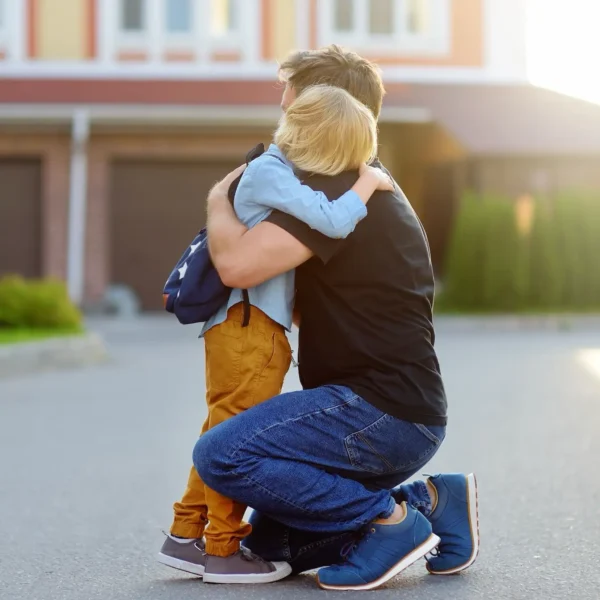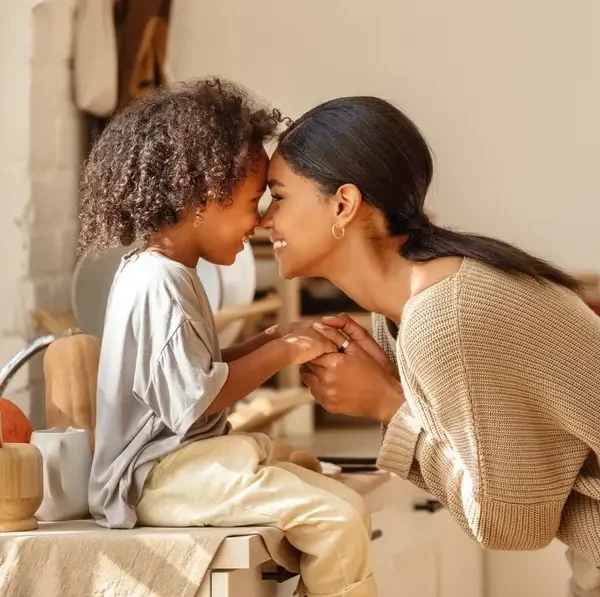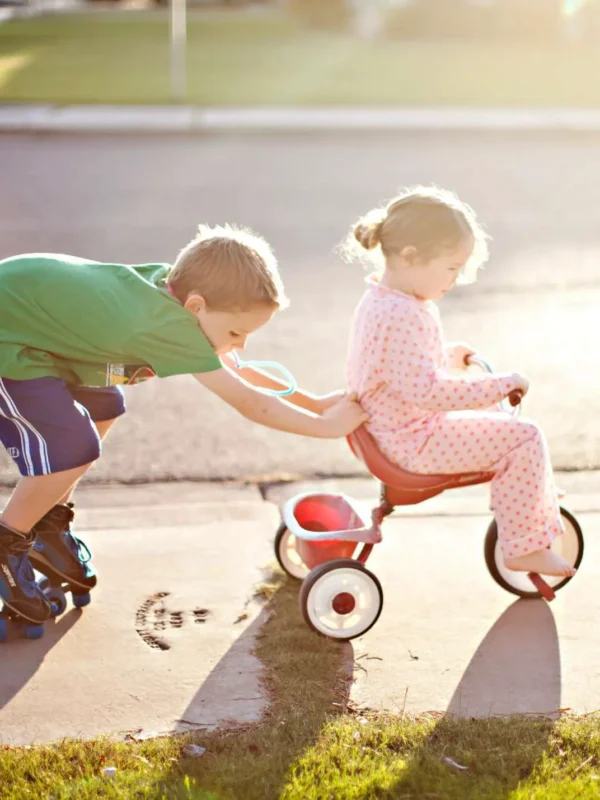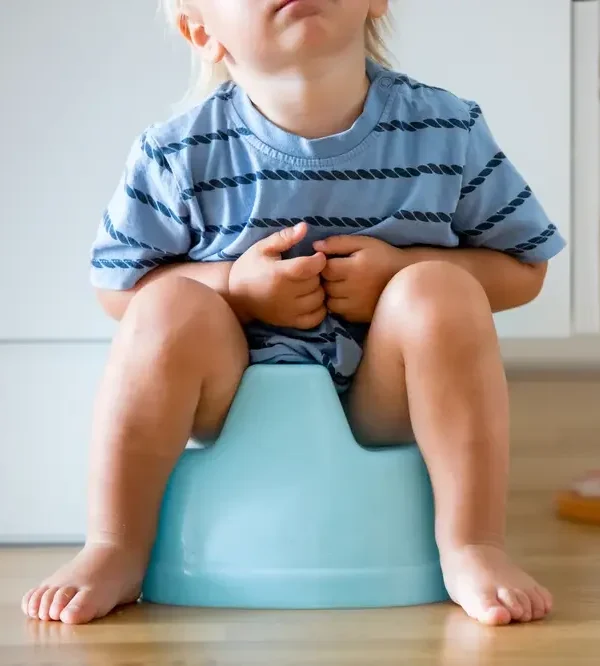
Let’s talk about something that stirs up uncomfortable feelings in just about every parent: lying.
Imagine this: you send your child to wash their hands before dinner. They disappear into the bathroom and return within 10 seconds, way too quickly to have actually washed them.
You ask, “Did you wash your hands?” and they answer, “Yes!” But you know they didn’t.
Now what?
When our children lie, oftentimes our first instinct is fear and judgement.
“Lying is bad. What do I do? Where did this come from? Is this a sign of a bigger problem?”
It’s normal to go straight to panic mode. Most of us believe that honesty is one of the most important values and, therefore, lying is one of the worst offenses.
But what if I told you that lying, especially for young children, isn’t always a sign of something “bad”? What if lying is… totally normal? Even developmentally appropriate?
Because here’s the truth: it is.
Lying Is a Normal Part of Child Development
When children begin to test out lying, it’s not usually about deception or manipulation. It’s about exploration. It’s about testing boundaries, their impulsivity, avoiding consequences, and trying to get their immediate needs met (like skipping tasks or squeezing in more play time).
In fact, the ability to lie requires specific cognitive development. It’s a sign that your child is learning to think abstractly, anticipate consequences, and understand the world in a more complex way.
Now, that doesn’t mean we ignore or condone lying. But it’s important to remember that when we react only with panic, shame, or judgement, we miss a big opportunity to guide our child toward honesty, self-awareness, and direct communication.
Step One: Ground Yourself
You think your child is lying. Before you respond impulsively, pause and ground yourself. Quiet the alarm bells ringing inside your head.
Remind yourself:
- This is common. (No, my child is not a future criminal)
- This is very human. (We all feel the urge to avoid or hide sometimes)
- This is not personal. (This is not about me)
Your child isn’t doing something to you. They’re not trying to hurt you, disrespect you, or be “bad.” They’re trying to solve a problem… in a not-so-skillful way.
This is your opportunity: not to shame them, but to teach them.
Step Two: Don’t Overreact
It’s so tempting to let our panic or frustration take over:
- “I know you’re lying!”
- “How could you say that?”
- “We don’t lie in this house!”
But big reactions based in judgement create shame and disconnection. They build a wall between you and your child. They also target the outer behavior only (the lie) without addressing the underlying feeling (fear, avoidance).
Your goal isn’t to “catch” your child lying. It’s to help them feel safe enough to tell the truth.
Step Three: Try Humor and Playfulness
If your child’s lying is occasional or seems low-stakes, steer clear of lectures and try humor instead.
Humor is a powerful parenting tool that lowers defensiveness, builds connection, increases cooperation, and teaches without shame.
Let’s go back to our child who said they washed their hands but didn’t. Your child insists, “I washed my hands!”
Try responding playfully:
“Wow! That was superhero-speed hand washing! Let’s take a peek… Hmm, I think I still see some sneaky dirt hiding here. Go ahead and try again. I know you can get it this time!”
You’re holding up a boundary (Hands need to get washed) but you’ve done it without shaming, judgment, or power struggles. You’ve kept the moment light, invited cooperation, and gently encouraged your child back to the necessary task.
Here’s another example – Your child insists: “I brushed my teeth!” but you’re not so sure.
Try saying with a smile:
“Hmm… did you brush them for real, or was it with a magical invisible toothbrush? Come here, let me see… Ooooh, I still see some of dinner in there. Yep, better go try again!”
Notice how you’re entering your child’s world, you’re strategically avoiding a power struggle, and you’re keeping things light.
When Lying Is More Frequent
If your child’s lying is occasional, humor works beautifully. But if lying is more frequent or concerning, it’s a sign to dig deeper.
Consistent lying may mean your child:
- Is afraid of your reaction
- Doesn’t feel fully safe making mistakes and coming clean
- Feels disconnected or powerless
In these cases, humor alone won’t cut it. You’ll need a more structured approach to help your child feel secure, seen, and supported, while still maintaining clear expectations and boundaries.
If you’re dealing with lying more often than you’d like, or if it’s already become a pattern, you’re not alone. Many parents feel caught between wanting to hold their child accountable and not knowing how to address the behavior without resorting to threats or punishments that don’t actually work. (They unintentionally make it worse)
That’s exactly why I created an extensive section on lying inside my Everything 3–7 Course.
This is where we go far beyond “don’t lie” and instead:
- Unpack why children lie (it’s usually not what you think!)
- Identify the underlying needs driving the behavior (if these are not addressed, the lying won’t stop)
- Give you practical, real-life scripts and tools to guide your child to come clean without shame or defensiveness.
- Teach you how to have reflective conversations that build trust and personal responsibility in your child.
- Help you shift away from reaction and punishment toward long-term emotional growth and connection.
The tools I share aren’t theoretical, they’re actionable. They’re the same tools I’ve used with thousands of families, and they’re designed to help you feel more calm, confident, and clear, even in the trickiest moments.
👉 Whether your child lies to avoid a task, escape consequences, or win your approval, you’ll learn how to respond with empathy and boundaries in a way that strengthens your relationship and builds emotional maturity.
➡️ Explore the Everything 3–7 Course and start transforming your parenting today.
Lying doesn’t have to be a crisis. With the right tools, you can turn these moments into valuable lessons and deepen your relationship with your child along the way.
 What’s The Difference Between A Threat And A Boundary?
What’s The Difference Between A Threat And A Boundary? The Path to Better Behavior Isn’t What You Think
The Path to Better Behavior Isn’t What You Think



